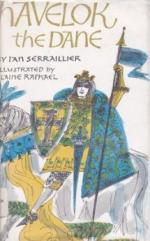“Fe, fi, fo, fum!” said Berthun; “here is surely a Cornish giant among us! Now I thank you, good Blunderbore, or whatever your name is, for brushing off these flies.”
“The folk in this place are unmannerly,” said Havelok; “hut if you want the bread carried up the hill I will do it for you.”
Berthun looked him up and down in a puzzled sort of way once or twice ere he answered, “Well, as that is your own proposal, pick your helpers and do so; I would not have asked such a thing of you myself.”
“There is not much help needed,” said Havelok. “I think this may be managed if I get a fair hold.”
Now we were used to seeing him carry such loads as would try the strength of even Raven and myself, who could lift a load for three men; but when he took the two great baskets of bread and swung them into place on either arm, a smothered shout went round the crowd, and more than once I heard the old Welsh name that the marsh folk had given him spoken.
“Let us be going,” said Havelok to the steward on that. “One would think that none of these had ever hefted a fair load in his life, to listen to them.”
So he nodded to me across the heads of the crowd, and followed Berthun, and the idlers followed him for a little. The guard turned these back at the gate, and Havelok went through, and I could see him no more.
Presently the crowd drifted back to their places, and I heard them talking. Havelok and his strength was likely to be a nine days’ wonder in Lincoln, and I was glad that I had asked him not to say whence he was.
“He is some thane’s son who is disguised,” said one.
“Maybe he is under a vow,” said another; and then one chimed in with a story of some prince of Arthur’s time, by name Gareth, who hid his state at his mother’s command.
“As for me,” said the baker, “I think that he is a fisher, as he looks —at least, that is, as his clothes make him.”
So even he had his doubts, and I will say that I understood well enough now why my father never brought him here before.
Havelok was long in coming back, as I thought, and I seemed to be wasting time here, and so I bethought me of the other man to whom the old dame had said we might go—namely, the captain of the gate. I should see Havelok if I stood there.
The captain was talking with some of his men as I came up, and of course it was of Havelok that they spoke; and seeing that I wore the same dress as he, they asked me if I knew who he was.
“He is a fisher from the coast,” I answered. “I have heard him called Curan.”
“Welsh then,” the captain answered, somewhat disappointed, as it seemed. “If he had been a Mercian, or even a Saxon, I would have had him here, but a fisher has had no training in arms after all.”
“Some of us have,” said I.
The captain looked me up and down, and then walked round me, saying nothing until we were face to face again.




